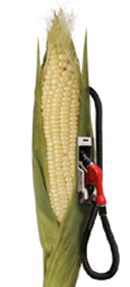While the US government foolishly turns to ethanol as part of the solution to reduce our dependence on foreign oil, the rapidly rising cost of corn is having devastating unintended consequences. A shortage of tequila and pricey tortillas. You may want to stock up on supplies now for next year’s Cinco de Mayo party.
According to MSNBC “The switch to corn will contribute to an expected scarcity of agave in coming years, with officials predicting that farmers will plant between 25 percent and 35 percent less agave this year to turn the land over to corn. “
 Seriously though, this is just one ripple affect on food prices. The demand for ethanol will undoubtedly lead to inflation across the entire food supply as acreage for other food supplies shrink and feed for animals skyrockets. How bad is it? It has become so expensive to feed their livestock corn based feed that one farmer is feeding his livestock cookies, licorice, cheese curls, candy bars, french fries, frosted wheat cereal and peanut-butter cups! Another farmer in Idaho is feeding them tater tots! See the entire article over at the Wall Street Journal (paid) According to the National Chicken Council (via HPJ.com) “The price of corn has driven the cost of feeding chickens up 40 percent. Chicken is the most popular meat with consumers.”
Seriously though, this is just one ripple affect on food prices. The demand for ethanol will undoubtedly lead to inflation across the entire food supply as acreage for other food supplies shrink and feed for animals skyrockets. How bad is it? It has become so expensive to feed their livestock corn based feed that one farmer is feeding his livestock cookies, licorice, cheese curls, candy bars, french fries, frosted wheat cereal and peanut-butter cups! Another farmer in Idaho is feeding them tater tots! See the entire article over at the Wall Street Journal (paid) According to the National Chicken Council (via HPJ.com) “The price of corn has driven the cost of feeding chickens up 40 percent. Chicken is the most popular meat with consumers.”
Ethanol induced food inflation could potentially have a significant impact on the economy and at worst be the catalyst for a global recession. If that weren’t enough, how about the destruction of our environment which lasts a lifetime? In Southeast Asia, vast areas of tropical forest are being cleared and burned to plant oil palms destined for conversion to biodiesel. Soybeans and especially corn are row crops that contribute to soil erosion and water pollution and require large amounts of fertilizer, pesticides, and fuel to grow, harvest, and dry. They are the major cause of nitrogen runoff — the harmful leakage of nitrogen from fields when it rains — of the type that has created the so-called dead zone in the Gulf of Mexico, an ocean area the size of New Jersey that has so little oxygen it can barely support life (via ForeignAffairs.org) Well at least someone is profiting from the destruction – just take a look at the charts of leading fertilizer producers Terra Nitrogen [TNH] and Potash [POT]. It’s a lose and lose situation for the environment.
Granted, to ease the pressure to produce corn, the administration is promoting such biofuels as cellulosic ethanol, which can be made from wood chips, switchgrass and corn-plant parts such as stalks and leaves. But the process of making ethanol from those sources still is still very much in its infancy and not very practical. Biofuels could be made efficiently from a variety of other sources, such as grasses and wood chips, if the government funded the necessary research and development. But in the United States, at least, corn and soybeans have been used as primary inputs for many years thanks in large part to the lobbying efforts of corn and soybean growers and Archer Daniels Midland Company (ADM), the biggest ethanol producer in the U.S. market. ADM owes much of its growth to political connections, especially to key legislators who can earmark special subsidies for its products. Vice President Hubert Humphrey advanced many such measures when he served as a senator from Minnesota. Senator Bob Dole (R-Kans.) advocated tirelessly for the company during his long career. As the conservative critic James Bovard noted over a decade ago, nearly half of ADM’s profits have come from products that the U.S. government has either subsidized or protected. – ForeignAffairs.org
I highly recommend reading the entire article How Biofuels Could Starve the Poor. It really lays out the case against using ethanol (particularly corn based) and how government is protecting inefficient ways of producing ethanol to preserve corporate profits at the risk of the environment and the economy. But what the heck right? After all it would be political suicide to denounce the use of ethanol. Anything for a few votes.
On a final note, here’s a good piece 20/20 did on the myth of ethanol.